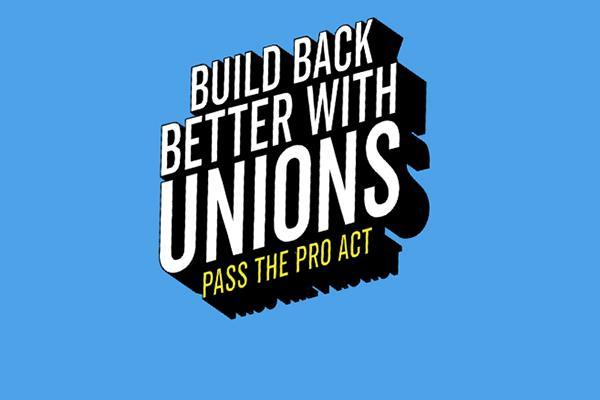If you want a real-world example of the difference the Protect the Right to Organize (PRO) Act could make, take a look at one paragraph in the National Labor Relations Board (NLRB) rerun election decision in the Amazon case in Bessemer, Alabama, and then consider what would happen if the PRO Act became law.
The PRO Act involves civil fines for labor law-breaking. Those higher fines are in the Build Back Better (BBB) Act, President Joe Biden’s expansion and repair of the nation’s frayed social safety net, now pending in the Senate. The fines would raise revenue, one goal of the Build Back Better bill.
In her ruling, Lisa Henderson, the NLRB’s regional director for much of the Southeast, including Birmingham, Bessemer and the rest of Northern Alabama, described Amazon’s campaign against the Retail, Wholesale and Department Store Union/UFCW’s organizing drive in a lot of detail. Her reporting included these words:
“Reviewing the nine factors the Board considers when assessing objectionable [employer] conduct, I find the conduct described in this objection weighs in favor of setting aside the election. Based on the size of the meetings, at a minimum, the employer held at least 240 separate meetings to ensure the attendance of approximately 6,000 employees.
“The employer held these meetings over four weeks, six days a week, 18 hours a day. This high number of ‘incidents’ goes to factor 1,” she said of the small group meetings, where management called in 12–25 workers each for eye-to-eye employer “conversation.” These are, of course, the infamous “captive audience” meetings where bosses and union-busters harangue workers, tell outright lies and generally scare them. Workers must attend. They can’t ask questions or they’ll face discipline, or worse. Union backers can’t call counter-meetings.
In Bessemer, Henderson reported, Amazon took attendance, literally. It scanned every worker’s badge and its bar code as he or she walked into the meeting room—and bosses charted who picked up anti-union paraphernalia on the way out, and who didn’t. The giveaways, on a table right by the only door, included “Vote no” buttons, key chains and lanyards.
This is where the PRO Act enters the picture. Including in the BBB act, the PRO Act would punish such captive audience meetings by fines, just as other unfair labor practices—labor law-breaking—would be punished. Right now, the captive audience meetings are legal—fine-free for the bosses.
Another thing it does in the BBB Act is increase the fines for all unfair labor practices: For a first offense, the fine would be $50,000. For a repeat offender, the fine doubles.
Remember, right now, there are no fines. Now take those figures and multiply them by 240.
All of a sudden, instead of free harangues, Amazon would have to start paying real money to get away with trying to intimidate and lie to its workers.
In this example, $50,000 times 240 meetings is…$12 million dollars. That’s a lot more than zero.
Or, better yet, let’s say that after the first 40 such captive audience meetings, the NLRB hearing officer rules Amazon is a repeat offender. So $50,000 for those first 40 meetings equals $2 million in fines, and $100,000 times the ensuing 200 is $20 million more. That’s no small potatoes.
Amazon founder and chief stockholder Jeff Bezos may be the richest or second richest person in the United States, but a $12 million fine or a $22 million fine likely would get even his attention. Especially since a third PRO Act provision would take the cash out of his own pocket. The PRO Act extends the fines to CEOs and other honchos.
No wonder AFL-CIO President Liz Shuler, in a Nov. 30 Zoom press conference on the BBB bill, called the higher fines for labor law-breaking “the biggest boost to workers’ rights, because it’ll have real penalties to employers who violate the right to form a union.”
Now maybe $22 million is barely noticeable for Bezos. After all, using IRS records, ProPublica reported last year that in 2007 and 2011, Bezos paid zero in income taxes. In 2014–2018, the latest figures available from that IRS records trove, he paid $973 million, on income of $4.22 billion and wealth growth of $99 billion. That’s a 23% personal income tax rate and a 0.98% wealth tax rate. The average taxpayer has higher tax rates than that.
And Bezos’s big haul was before Amazon cashed in on the delivery bonanza it’s gotten due to everyone having to hole up at home and order online thanks to the coronavirus pandemic. But even Bezos might balk and blister at having to personally fork another $22 million to the feds.
The prospect might even convince him to obey labor law. Ditto for his corporate lackeys.
See what a difference the PRO Act can make, once you apply it to the real world? It actually would hit Jeff Bezos—and all the other corporate crooks—right where it hurts most.
In the wallet.
Which gives you even more incentive to pick up the phone and call your senators, no matter their party, and order them: “Pass Build Back Better! Make corporate crooks pay!”

